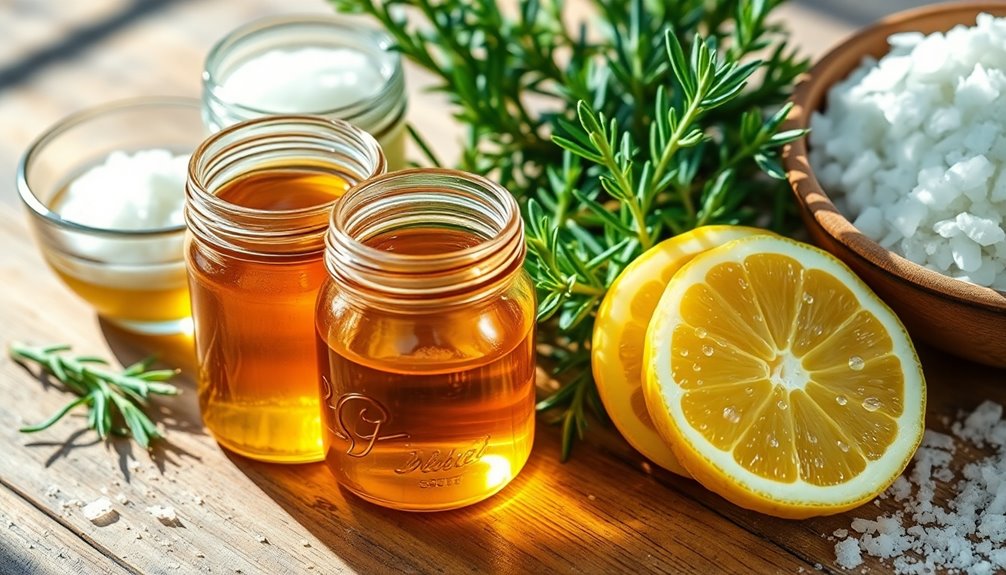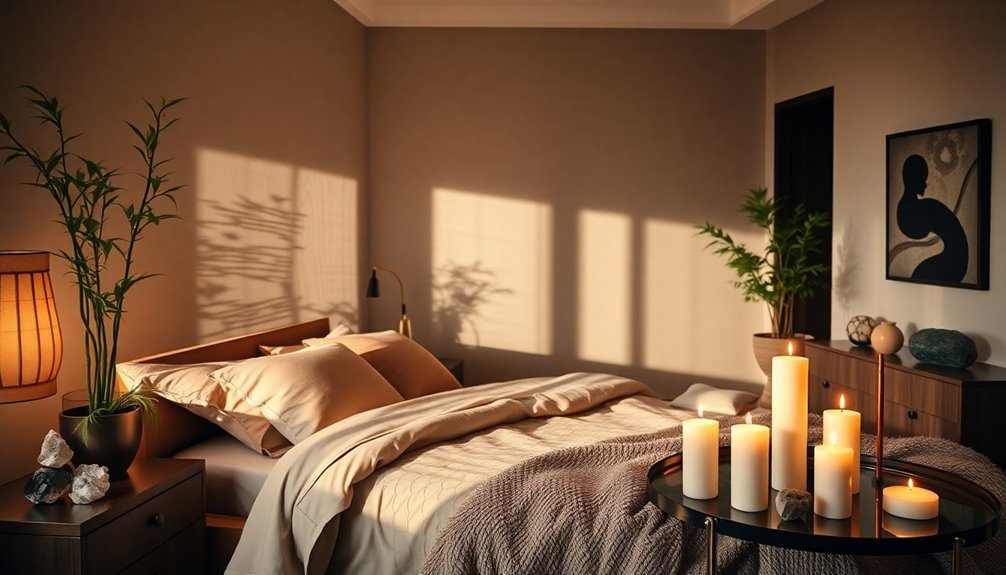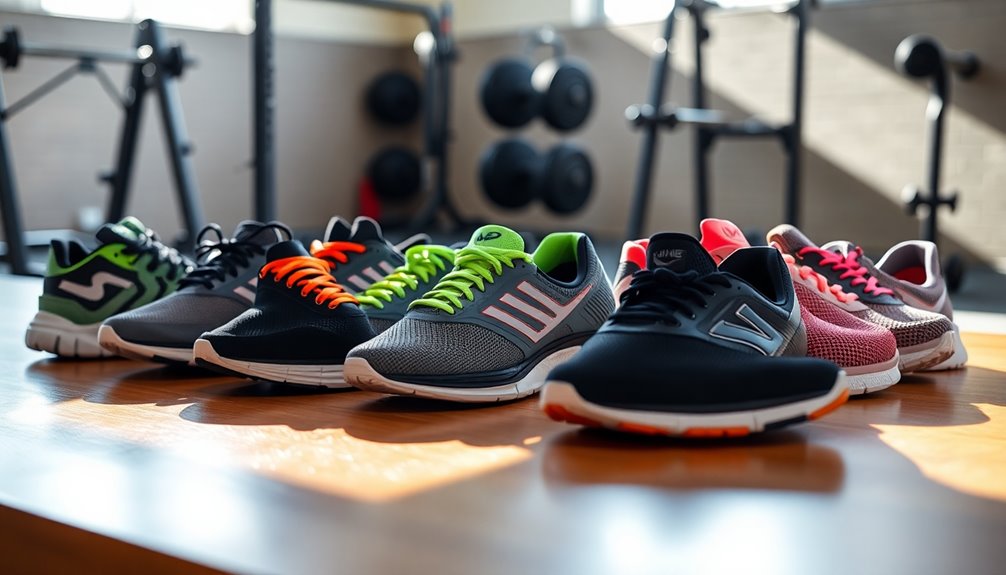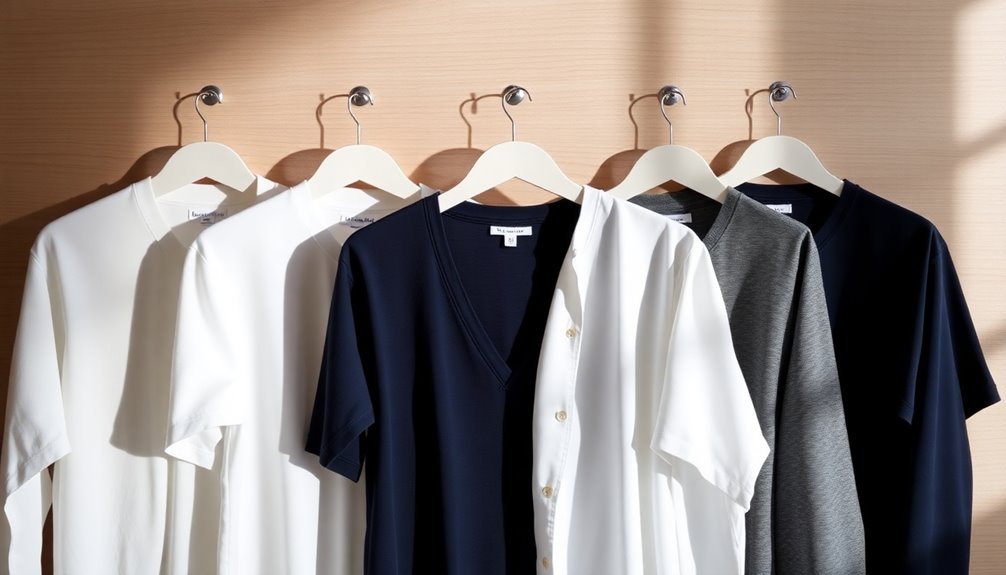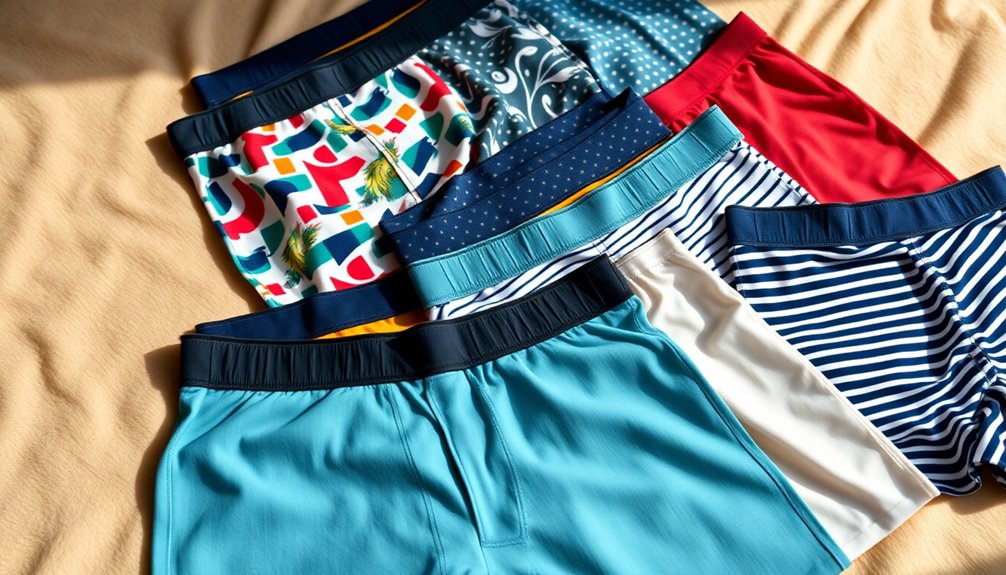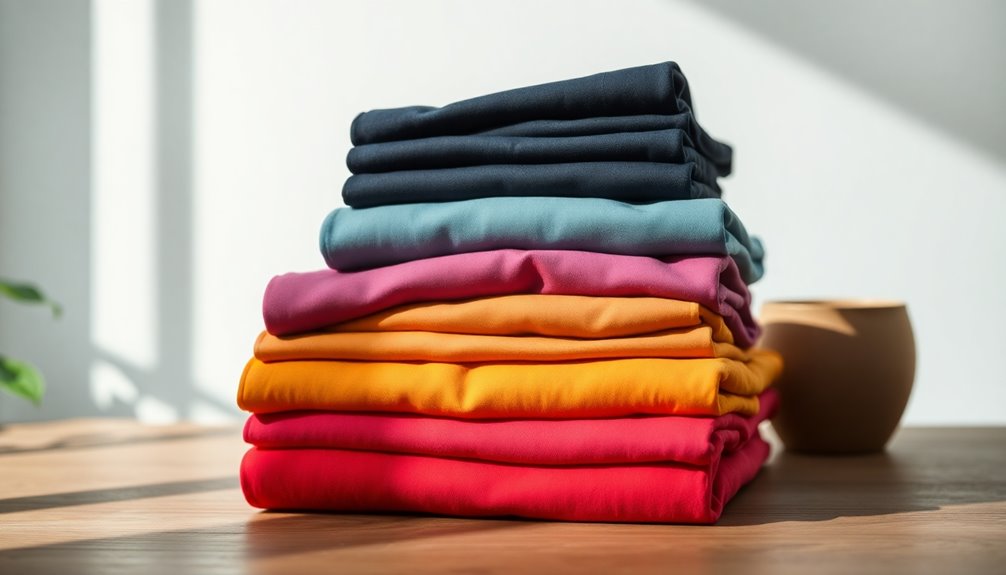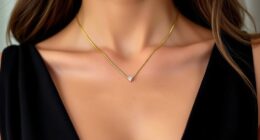When I explore the world of homemade beauty products, I find natural preservatives to be game-changers. They extend shelf life and keep our creations safe from microbial growth. I love options like Leucidal Liquid and Phenoxyethanol for their effectiveness and plant-based origins. Skin Perfection and Germaben II are great for different types of formulations. It's vital to take into account usage rates and pH levels to guarantee they work their best. Plus, proper sanitization and storage of our products are key. Stick around, and I'll share even more about the best natural preservatives you absolutely need in your beauty toolkit!
Key Takeaways
- Natural preservatives like Leucidal Liquid and Skin Perfection enhance shelf life while inhibiting microbial growth in homemade beauty products.
- Phenoxyethanol and Germaben II are effective alternatives that are paraben-free and suitable for various formulations.
- AMTicide Coconut Ferment not only preserves but also conditions, making it ideal for moisturizing products.
- Proper usage rates (1% to 4%) and pH levels (2 to 7) are crucial for the effectiveness of natural preservatives.
- Regular testing for microbial contamination and proper storage conditions ensure safety and longevity of homemade beauty formulations.
Phenonip Preservative for Lotion, Cream, Lip Balm or Body Butter (2 Oz)
If you're crafting your own lotions, creams, or lip balms, Phenonip is an excellent choice for preserving your creations. This broad-spectrum preservative works wonders in water-based formulations, ensuring your products stay fresh and safe to use. With just one 2 oz bottle, you can preserve about 12 lbs of product, which is pretty impressive! I recommend using it at a rate of 1% to 3%, depending on your total weight. It mixes well in both oil and water-based products, especially when heated properly. While some users mention a stronger chemical scent in recent batches, the overall effectiveness has kept me coming back for more. I've found that it's particularly great for tricky ingredients like flaxseed gel.
Best For: DIY cosmetic enthusiasts looking for an effective preservative for their lotions, creams, and lip balms.
Pros:
- Effective preservation for a variety of water-based formulations, including challenging ingredients.
- Versatile usage in both oil and water-based products, enhancing formulation options.
- Excellent customer support with prompt assistance for product usage inquiries.
Cons:
- Stronger chemical scent noted in some recent batches, which may affect the final product.
- Lack of clear instructions on effective usage, leading to potential confusion for new users.
- Requires careful calculation of usage rates based on total product weight, which may be cumbersome for some.
Skin Perfection Leucidal Liquid – Natural Preservative for DIY Skincare
Skin Perfection Leucidal Liquid is the ideal choice for DIY skincare enthusiasts looking to create natural, effective products without synthetic preservatives. Derived from fermented radishes, this plant-based moisturizer not only enhances hydration but also extends the shelf life of your homemade lotions and serums. With a volume of 0.5 oz, it's perfect for use in various formulations, including Vitamin C serums and body lotions. Users have reported achieving a plump and rejuvenated complexion, with typical shelf life extending to six months—some products even last up to nine months without bacterial growth. However, I've noticed some limitations with water-containing products, where mold can develop quickly. Overall, it's a fantastic option for those aiming for a clean skincare routine.
Best For: DIY skincare enthusiasts seeking a natural preservative alternative for their homemade products.
Pros:
- Enhances skin hydration and promotes a rejuvenated complexion.
- Acts as a natural preservative, extending the shelf life of homemade cosmetics.
- Made from plant-based ingredients, eliminating synthetic additives.
Cons:
- Limited effectiveness in preserving water-containing products, with potential for mold development.
- Shelf life may vary, with some products lasting only up to six months.
- Requires careful formulation to ensure optimal preservation results.
PHENOXYETHANOL Preservative Liquid (8 oz)
PHENOXYETHANOL Preservative Liquid (8 oz) is an excellent choice for DIY beauty enthusiasts who want to create effective, safe, and long-lasting products. This versatile preservative is paraben-free and formaldehyde-free, making it skin-friendly and suitable for all skin types, including sensitive skin. I love that it's water and oil soluble, which means I can use it in a wide range of creations like lotions, creams, and shampoos.
Its 100% pure formulation doesn't alter the texture, fragrance, or color of my products. However, I always remember to dilute it to 1% or less before use and take proper safety precautions. With PHENOXYETHANOL, I can confidently extend the shelf life of my homemade beauty items while ensuring they remain fresh and safe to use.
Best For: DIY beauty enthusiasts looking for a safe and effective preservative for their homemade skincare products.
Pros:
- Paraben-free and formaldehyde-free, making it suitable for sensitive skin.
- Water and oil soluble, allowing for versatile use in various formulations.
- 100% pure formulation that does not affect the texture, fragrance, or color of products.
Cons:
- Must be diluted to 1% or less before use, which requires extra preparation.
- Not suitable for pregnant/nursing individuals, babies, or young children, limiting its use.
- Some users have reported issues with product integrity, including foreign objects and unpleasant odors.
Skin Perfection Leucidal Liquid SF Complete – DIY Preservative Alternative for Cosmetics
For DIY enthusiasts and small business owners looking to create high-quality skincare products, Skin Perfection Leucidal Liquid SF Complete stands out as a versatile natural preservative alternative. This powerful ingredient not only offers broad-spectrum protection but also enhances the moisturizing properties of your formulations. I love how it can extend the shelf-life of my creations by 6 to 18 months, making it perfect for humid environments. Made from fermented Lactobacillus and Cocos nucifera, this preservative is vegan, gluten-free, and non-GMO, aligning perfectly with my commitment to natural ingredients. Plus, it's certified ECOCERT and works effectively within a pH range of 3-8, ensuring my products are both professional-grade and environmentally conscious.
Best For: DIY enthusiasts, estheticians, small business owners, and entrepreneurs looking for a natural preservative alternative for skincare formulations.
Pros:
- Broad-spectrum protection that enhances the moisturizing properties of formulations.
- Extends shelf-life by 6 to 18 months, ideal for humid environments.
- Made from vegan, gluten-free, and non-GMO ingredients, aligning with natural product standards.
Cons:
- May require specific pH adjustments to ensure effectiveness.
- Limited availability in some regions compared to traditional preservatives.
- Potentially higher cost compared to synthetic preservatives.
PHENOXYETHANOL EcoBalanced Liquid for Homemade Cosmetics (4.23 Oz)
When creating homemade cosmetics, having a reliable preservative is essential, and that's where PHENOXYETHANOL EcoBalanced Liquid shines. This clear, colorless, and odorless liquid effectively extends the shelf life of my skincare products without altering their fragrance or consistency. I love that it's free from additives, parabens, and artificial fragrances, making it a safe choice for my creations. Using it in small amounts—no more than 1%—ensures that my products remain intact. Users rave about its effectiveness, especially in creams and lotions, and I've found it incredibly easy to mix. Plus, it's competitively priced compared to other preservatives. With PHENOXYETHANOL, I can confidently craft quality homemade cosmetics that last.
Best For: DIY enthusiasts and crafters looking for a safe and effective preservative for homemade cosmetics.
Pros:
- Effective at extending the shelf life of skincare products without altering their fragrance or consistency.
- Free from harmful additives, parabens, and artificial fragrances, making it a safe choice for various skin types.
- Easy to mix into formulations, ensuring a smooth application and product quality.
Cons:
- Should be used in small amounts (no more than 1%), which may limit its effectiveness in some formulations.
- External use only; ingestion or direct skin contact with pure phenoxyethanol can cause irritation.
- Some users may prefer a more natural preservative alternative, as phenoxyethanol is still a synthetic compound.
Skin Perfection Leucidal Liquid Complete – Alternative Preservative for Lotion Making
Choosing Skin Perfection Leucidal Liquid Complete as a preservative for your lotion making means embracing a natural solution that caters to both DIY enthusiasts and professional formulators. This preservative combines Leucidal Liquid, Lactobacillus, and AMTicide Coconut Ferment, offering not just protection against microbial growth but also moisturizing benefits for your skin and hair.
When using it, heat it to 95-104°F and incorporate a 4% concentration for best results. It's vegan, gluten-free, and non-GMO, making it a safe choice for most formulations. Many users rave about its effectiveness in keeping products fresh, although some mention a soapy fragrance in certain blends. Overall, it's a reliable alternative for those looking to create high-quality, homemade beauty products.
Best For: DIY skincare enthusiasts and professional formulators seeking a natural preservative for their homemade lotions and creams.
Pros:
- Vegan, gluten-free, and non-GMO, making it suitable for a wide range of users.
- Provides moisturizing benefits in addition to protecting against microbial growth.
- Users report effectiveness in maintaining product freshness for extended periods.
Cons:
- Some users experience a soapy fragrance in specific formulations.
- The price may be considered high for the size offered by some customers.
- Beginners may find the heating process and concentration measurement challenging without prior experience.
Phenoxyethanol Liquid for Preservative (120 Ml)
If you're a DIY beauty enthusiast looking for a reliable preservative, Phenoxyethanol Liquid (120 ml) is an excellent option. This transparent liquid is free of additives and parabens, making it ideal for my homemade skincare formulations. I've found it effective in various products like moisturizers, sunscreens, and even shampoos. It's particularly useful against both gram-positive and gram-negative bacteria, which is essential for maintaining product safety. Users often rave about its quality and effectiveness, especially in hair and bath products. However, some have mentioned concerns about its watery consistency and the state of the bottle upon arrival. Overall, I believe Phenoxyethanol is a solid choice for preserving my DIY beauty creations.
Best For: DIY beauty enthusiasts seeking a reliable and effective preservative for homemade skincare products.
Pros:
- High efficacy against gram-positive and gram-negative bacteria, ensuring product safety.
- Free of additives and parabens, making it suitable for natural formulations.
- Generally well-received by users for its quality and performance in various cosmetic applications.
Cons:
- Some users have reported concerns about the watery consistency of the product.
- A few customers experienced issues with the bottle being wet upon arrival, raising questions about purity.
- Mixed reviews regarding product consistency may affect user experience.
Leucidal Complete Radish Root + AMTicide Coconut Ferment Skincare (0.5 oz)
Leucidal Complete Radish Root + AMTicide Coconut Ferment is the perfect choice for anyone passionate about creating their own skincare products while prioritizing natural ingredients. This water-soluble preservative is a fantastic alternative to synthetic options, ensuring your DIY formulations stay fresh and effective. I love that it's vegan and free from common allergens, making it suitable for a wide range of users. With about 300 drops in a 0.5 oz bottle, you can easily achieve a 4% concentration for various products like lotions, serums, and moisturizers. Just remember, this ingredient should be used in formulations and not applied directly to the skin. It is crucial to sanitize your workspace to maintain quality and effectiveness in your creations.
Best For: DIY skincare enthusiasts looking for a natural and eco-friendly preservative alternative.
Pros:
- Vegan and allergen-free, making it suitable for a wide range of users.
- Water-soluble and stable up to 158°F (70°C), allowing for versatile formulations.
- Provides approximately 300 drops per 0.5 oz, enabling multiple skincare products.
Cons:
- Users may experience consistency issues, as the product might not always be liquid as expected.
- Requires sanitization of utensils and work areas, adding extra preparation time.
- It is non-returnable due to health concerns, limiting options if dissatisfaction occurs.
Skin Perfection Leucidal Liquid SF Max – DIY Preservative for Homemade Skincare
For anyone passionate about crafting their own skincare products, Skin Perfection Leucidal Liquid SF Max stands out as an ideal DIY preservative. This powerful preservative, derived from Lactobacillus Ferment, not only protects your creations but also enhances skin conditioning. With a 4-ounce bottle yielding enough for about 12 batches, it's both economical and effective.
I love that it's free from synthetic preservatives, making it a skin-friendly option for serums, creams, and toners. Plus, it's on the Whole Foods Acceptable Premium List and suitable for Ecocert certification. Just remember to use it at a recommended 4% concentration, and guarantee your workspace is sanitized. It's a game-changer for anyone wanting to keep their homemade skincare safe and clean!
Best For: DIY skincare enthusiasts looking for a natural preservative option to enhance the safety and longevity of their homemade products.
Pros:
- Natural Ingredients: Free from synthetic preservatives, making it a skin-friendly choice.
- Versatile Use: Suitable for a variety of DIY formulations, including serums, creams, and toners.
- Certified Quality: Listed on the Whole Foods Acceptable Premium List and suitable for Ecocert certification.
Cons:
- Limited Shelf Life: Recommended usage at a 4% concentration may not preserve products as long as traditional preservatives.
- Sanitization Required: Requires thorough sanitization of utensils and workspace to ensure safety.
- Non-Returnable: Due to health and safety concerns, the product cannot be returned once purchased.
Germaben II Natural Preservative for DIY Cosmetic Products (1 Oz / 30 mL)
Germaben II Natural Preservative (1 Oz / 30 mL) is perfect for DIY enthusiasts who want to create safe and effective beauty products. This versatile preservative offers broad-spectrum protection, making it ideal for lotions, creams, and shampoos. I love that it's paraben-free, which aligns with the growing demand for safer formulations. Germaben II maintains the stability and efficacy of my creations over time, ensuring they stay effective. Plus, its liquid form makes it super easy to incorporate into any recipe, allowing for uniform distribution without any hassle. However, I do recommend adding larger print for usage details and specific ratios to help with mixing fat and water-soluble solutions. With Germaben II, I can confidently craft my own beauty products!
Best For: DIY enthusiasts looking to create safe and effective water-based cosmetic products.
Pros:
- Broad-spectrum protection ensures the stability and integrity of formulations.
- Paraben-free formulation caters to the increasing demand for safer beauty products.
- Easy to use in liquid form allows for uniform distribution in various recipes.
Cons:
- Suggested usage details may need larger print for better visibility.
- Lack of specific ratios for mixing fat and water-soluble solutions could complicate formulations.
- Some users may require additional guidance for effective incorporation into their recipes.
The Complete Idiot's Guide to Making Natural Beauty Products
If you're enthusiastic to plunge into the world of DIY beauty products, "The Complete Idiot's Guide to Making Natural Beauty Products" is the perfect resource for you. I found it incredibly insightful, especially as I shifted from commercial to natural products. The book offers a range of recipes, from basic moisturizers to more complex formulations, helping both beginners and seasoned makers. While it touches on anhydrous preservatives, I recommend doing extra research on specific ingredients for your needs. Some recipes may require hard-to-find items, so keep that in mind. Despite a few limitations, the clear explanations and practical tips make it a valuable addition to anyone's beauty-making journey. You'll feel empowered to create effective, natural products tailored to your preferences!
Best For: Anyone looking to transition from commercial to natural beauty products and interested in DIY formulations.
Pros:
- Offers a wide variety of recipes suitable for both beginners and experienced users.
- Provides clear explanations and practical tips for making effective natural products.
- Empowers users with knowledge about ingredient origins and benefits.
Cons:
- Some ingredients may be hard to find or expensive, especially outside the U.S.
- Limited coverage of hair care recipes, which may disappoint some users.
- Lack of specific preservative recommendations for certain formulations.
Leucidal Liquid SF Max Natural Preservatives for Cosmetics (16 oz)
Leucidal Liquid SF Max is an ideal choice for DIY beauty enthusiasts seeking a natural preservative that effectively combats harmful bacteria. This powerful product offers superior protection against Lactobacillus Ferment and is compatible with a variety of skincare ingredients. I love its moisture surge benefit, making it perfect for serums and lotions, especially those containing Hyaluronic Acid and Vitamin C.
You'll want to use it at a 4% concentration for best results. Plus, it's free from synthetic preservatives, so I feel good about using it in my homemade beauty products. Just remember to sanitize your work area and tools before diving in. With Leucidal Liquid SF Max, you can confidently create effective and safe cosmetic formulations.
Best For: DIY beauty enthusiasts looking for a natural preservative to enhance their skincare formulations.
Pros:
- Natural formulation free from synthetic preservatives, making it safe for homemade cosmetics.
- Compatible with a wide range of active ingredients, including Hyaluronic Acid and Vitamin C.
- Moisture surge benefits that improve the overall texture and hydration of serums and lotions.
Cons:
- Non-returnable due to health and safety concerns, limiting purchase options.
- Requires proper sanitization of tools and workspace, which may be cumbersome for some users.
- Recommended usage at a specific concentration (4%) may be challenging for beginner formulators.
101 Easy Homemade Products for Skin, Health & Home
Creating easy homemade products for skin, health, and home is perfect for anyone seeking a more natural approach to personal care. I recently dove into Jan Berry's book, "101 Easy Homemade Products for Your Skin, Health & Home," which offers a treasure trove of recipes. From the Honey, Rose & Oat Face Cleanser to Lavender Oatmeal Soap, I loved how each recipe is straightforward and customizable. Jan highlights essential ingredients like sweet almond oil, making it easy to source what I need. Plus, she emphasizes safety with detailed information on shelf life and usage. This book has not only expanded my DIY skills but also connected me with a community of like-minded natural living enthusiasts. It's a fantastic resource!
Best For: Those interested in natural living and DIY enthusiasts looking to create homemade products for personal care and home use.
Pros:
- Offers a wide variety of easy-to-follow recipes suited for beginners and experienced DIYers.
- Encourages customization of recipes, allowing users to experiment with different natural ingredients.
- Provides essential safety information and shelf life details, ensuring safe usage of homemade products.
Cons:
- Some ingredients may be difficult to find or require special sourcing.
- Not all recipes may be suitable for individuals with specific allergies or sensitivities.
- Requires an investment of time and effort to gather ingredients and create products.
Skin Perfection Leucidal Complete Preservative for Lotion Making
For those crafting their own skincare and haircare products, Skin Perfection Leucidal Complete Preservative stands out as an ideal choice. This water-based, non-synthetic preservative combines Leucosal Liquid, Lactobacillus, and AMTicide Coconut Ferment, making it perfect for lotions, creams, and cleansers. I love that it's vegan, gluten-free, and non-GMO, plus it's accepted by Whole Foods.
To use it, simply heat your product to 95-104°F and add a 4% concentration of Leucidal Complete. As someone who enjoys DIY beauty, I've found it provides excellent moisturizing benefits for both skin and hair. Just remember to use sanitized supplies and store your creations in cool, dry places. Overall, it's a fantastic addition to any natural formulation!
Best For: DIY skincare and haircare enthusiasts seeking a natural, effective preservative for their formulations. In addition to providing a natural preservative for skincare and haircare products, this option is also ideal for those looking to create sustainable hair styling products. With its effectiveness in preserving natural formulations, it can help reduce the need for synthetic preservatives, making it a great choice for environmentally-conscious consumers. Whether you’re making your own shampoo, conditioner, or styling products, this natural preservative can help ensure the longevity and quality of your DIY creations.
Pros:
- Vegan, gluten-free, and non-GMO, making it suitable for a variety of dietary preferences.
- Provides moisturizing and conditioning benefits for both skin and hair.
- Accepted for use by Whole Foods, ensuring high-quality standards.
Cons:
- Some users reported inconsistent product consistency, particularly at room temperature.
- Requires heating to 95-104°F, which may be a hassle for beginners.
- Recommendations for clearer usage instructions and packaging information have been noted.
Dr Joe Lab Cosmetic Preservative Blend (16 oz)
When it comes to formulating beauty products, Dr. Joe Lab's Cosmetic Preservative Blend is a game-changer. This blend combines Dehydroacetic Acid and Benzyl Alcohol, offering broad-spectrum preservation at a budget-friendly price. I love that it's light in color and nearly odorless, making it versatile for lotions, creams, body butters, and more.
The blend operates effectively in a pH range of 2 to 7, which is essential for maintaining efficacy. It's also globally approved and eco-certified, ensuring safety. I've found it works wonderfully in both heated and room-temperature formulations. Just remember to add it at the right stage for best results. Overall, it's become a staple in my DIY beauty routine, providing reliability without compromise.
Best For: DIY beauty enthusiasts looking for a reliable and eco-friendly preservative for their cosmetic formulations.
Pros:
- Broad-spectrum efficacy at a budget-friendly price, making it accessible for various formulations.
- Globally approved and eco-certified, ensuring safety and effectiveness in cosmetic applications.
- Versatile compatibility with both heated and room-temperature formulations, enhancing ease of use.
Cons:
- Efficacy may be compromised in formulations with a pH above 7.
- Requires careful timing of application during the manufacturing process to ensure optimal performance.
- May cause discoloration when used with certain surfactants and anionics, requiring caution in formulation.
Factors to Consider When Choosing Natural Preservatives for Homemade Beauty Products

When I choose natural preservatives for my homemade beauty products, I think about several key factors. Ingredient compatibility, preservation duration, and the pH range of my formulation all play essential roles in ensuring effectiveness. Plus, I can't overlook the sensory characteristics and ease of use, as they can make or break the overall experience.
Ingredient Compatibility
Choosing the right natural preservative hinges on ingredient compatibility, as it directly affects the stability and effectiveness of your homemade beauty products. I've learned that certain preservatives work best with specific pH ranges. For instance, some are effective only within a pH of 3-8, while others falter above pH 7. This means I always check the pH of my formulations before selecting a preservative.
When it comes to solubility, I've found that water-soluble preservatives excel in aqueous products, while oil-soluble ones shine in oil-based formulations. The effectiveness and stability of the preservative can change dramatically based on this compatibility.
Moreover, I pay close attention to how preservatives interact with other ingredients. Some might cause discoloration or unpleasant odors, especially with certain surfactants and emulsifiers.
Ultimately, I consider the intended shelf life of my product. Some natural preservatives might only offer short-term protection compared to synthetic options. By carefully evaluating these compatibility factors, I can guarantee my homemade beauty products remain stable and effective for as long as possible.
Preservation Duration
Understanding ingredient compatibility is only part of the journey; preservation duration plays a significant role in guaranteeing my homemade beauty products remain effective and safe over time. I've learned that the lifespan of natural preservatives can vary widely—some extend shelf life for about six months, while others can last up to 18 months. This variation often hinges on the specific formulation I'm using. For instance, water-containing products generally have shorter shelf lives compared to anhydrous formulations.
I also pay attention to factors like pH levels, temperature stability, and the presence of certain ingredients, as these can greatly influence how long my preservative will work effectively. It's vital to use natural preservatives in the right concentrations, typically around 1% to 4%, to guarantee peak preservation duration.
Lastly, I never skip regular testing for microbial contamination. Even the best natural preservatives can fail if my formulation isn't properly balanced or if I don't store it correctly. By keeping all these factors in mind, I can better protect my creations and enjoy them for longer.
Formulation Ph Range
The pH range of my beauty product formulations is vital for guaranteeing the effectiveness of natural preservatives. Many of these preservatives work best within a specific pH range, typically between 3 and 8. If the pH goes above 7, preservatives may lose their efficacy, which can lead to microbial growth and spoilage.
To choose the right preservative, I always pay close attention to the pH of both my ingredients and the final product. For instance, natural preservatives from Lactobacillus or fermented ingredients thrive in slightly acidic conditions, just like our skin. Knowing this helps me secure stability and longevity in my formulations.
Regular monitoring of pH during the formulation process is important. I often find that adjustments are necessary to maintain the effectiveness of my chosen preservative. If I notice the pH drifting out of the ideal range, I take action to bring it back in line. This way, I can confidently create beauty products that are not only safe and effective but also free from synthetic preservatives. By keeping pH in check, I can enjoy the benefits of natural preservation without compromising quality.
Sensory Characteristics
When it comes to formulating homemade beauty products, sensory characteristics play an important role in my decision-making process for selecting natural preservatives. I've learned that the scent and texture of these preservatives can greatly influence the overall experience of the product. For instance, some preservatives like Leucidal Liquid offer moisturizing benefits, enhancing skin hydration while contributing to a plump appearance. However, I've also encountered preservatives that can impart a chemical scent, which isn't ideal for my formulations.
It's vital to take into account that the scent of preservatives can vary between batches, potentially affecting the final fragrance when combined with essential oils. I always aim for a pleasant sensory profile, as products with appealing textures and scents are far more likely to be accepted by users. I've noticed that off-putting odors can really detract from the overall experience, making it important to choose wisely. By paying attention to these sensory properties, I guarantee that my homemade beauty products not only perform well but also delight the senses, ultimately leading to happier customers who appreciate the care I put into my formulations.
Ease of Use
Choosing natural preservatives for my homemade beauty products can be a bit intimidating, especially with the varying levels of ease associated with each option. I've discovered that the usability of these preservatives differs considerably. Some require specific temperature adjustments or unique mixing techniques to guarantee they're evenly distributed in my formulations, which can be a hassle.
I appreciate that many natural preservatives have clear recommended usage rates, typically between 1% and 4%. This simplifies my calculations and makes it easier to incorporate them into my recipes. Additionally, I love that some preservatives work well in both oil and water-based products, increasing their versatility and making them a staple in my DIY projects.
It's vital to remember that I need to sanitize all my utensils and workspace when using these preservatives to maintain product integrity. I've learned from my experiences that having clear instructions is essential, as different formulations can yield varying results. Overall, by considering these factors, I can choose natural preservatives that not only work effectively but also fit into my DIY beauty routine seamlessly.
Safety Considerations
Safety is paramount for me when selecting natural preservatives for my homemade beauty products. I always make certain to use preservatives according to the recommended usage rates, typically between 1% to 4%. This guarantees both safety and effectiveness in my formulations. Each preservative has its own safety precautions, so I avoid direct skin contact with concentrated forms. I wear gloves and goggles while I'm working to prevent irritation.
I also consider the shelf life of my products. Natural preservatives can extend it anywhere from 6 to 18 months, but I know that proper storage conditions are vital to prevent microbial growth. Monitoring the pH level is another critical aspect; some preservatives work best within specific pH ranges, usually around 3-8.
Before starting, I sanitize all my utensils and work areas to minimize the risk of contamination and to guarantee the quality of my final products. By paying attention to these safety considerations, I feel confident that my homemade beauty products are both effective and safe for use.
Cost-Effectiveness
In evaluating the cost-effectiveness of natural preservatives for my homemade beauty products, I focus on several key factors that can greatly impact my budget. First, I consider the yield of the preservative. A small bottle can often preserve a significant weight of product, translating to lower costs per batch. I also assess the concentration needed for effective preservation; some natural preservatives require lower percentages, which can help reduce overall ingredient costs.
Shelf life is another vital factor. A longer shelf life from a preservative minimizes waste and reduces the need for frequent repurchases. Additionally, I look for versatility in the preservatives I choose. Those suitable for a variety of formulations can save me money by eliminating the need for multiple products.
Lastly, I think about the potential for creating larger batches of products. Using effective preservatives allows me to make more at once, which leads to cost savings over time. By focusing on these aspects, I can guarantee that I'm not only saving money but also maximizing the quality of my homemade beauty products.
Frequently Asked Questions
Are Natural Preservatives Safe for All Skin Types?
I often wonder about the safety of natural preservatives for different skin types. From my experience, many natural preservatives are generally safe, but individual reactions can vary. I recommend patch testing any new ingredient first. This way, I can determine if my skin reacts negatively. It's also essential to read labels and choose high-quality products, as some natural preservatives may still irritate sensitive skin. Always listen to your skin's needs and consult a dermatologist if unsure.
How Long Do Homemade Beauty Products Last With Natural Preservatives?
When I make homemade beauty products with natural preservatives, I usually find they last anywhere from a few weeks to a few months, depending on the ingredients I use. For instance, products with vitamin E or honey tend to stay fresh longer. I always check for changes in smell or texture, as those are signs it's time to toss them. It's important to store them properly, too, for maximum shelf life.
Can I Mix Different Preservatives in My Formulations?
Absolutely, you can mix different preservatives in your formulations! I often combine them to enhance effectiveness and extend shelf life. Just be sure to research compatibility and recommended usage rates for each preservative. I've found that blending can create a more stable product, and it gives me peace of mind knowing I'm better protecting my creations. Experimenting with combinations has led to some of my favorite formulations!
What Are the Signs That My Beauty Product Has Spoiled?
I once opened a jar of homemade jam, only to find it bubbling and moldy. It was a sad sight! When it comes to beauty products, you should watch for changes in color, smell, or texture. If it smells off or has separated, it's likely spoiled. Just like that jam, anything that looks or feels "off" should be tossed. Trust your senses; they're often your best guide!
Do Natural Preservatives Have Any Scent or Affect Product Aroma?
When I use natural preservatives, I often wonder about their scent and how they'll affect my product's aroma. I've noticed that some can have a mild scent, while others are almost undetectable. It really depends on the type I choose. Generally, the right natural preservatives shouldn't overpower the fragrance of my beauty products but can sometimes add a subtle note. It's all about finding the right balance for my creations!
Conclusion
In the world of homemade beauty products, natural preservatives are like the guardians of your creations, ensuring they remain safe and effective. By choosing the right preservative, you're not just extending shelf life; you're nurturing your skin with care. Remember, each ingredient you select tells a story about your commitment to quality and health. So, embrace these natural options and let your beauty products shine, knowing they're protected for you to enjoy!
